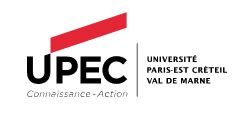Master's degree Mathematics and applications


Entry requirements
M1 is for students who have a degree in Mathematics.
M2 is for students who have successfully completed a first year of a Master's in Pure or Applied Mathematics or in Mathematics-Computer Science or who can prove they have an equivalent level, as well as Grande Ecole students.
Applications are examined by a committee.
Benefits of the program
Supported by very high level research laboratories (LAMA, CERMICS, LIGM) and the Bézout Labex.
Attractiveness, clarity and career opportunities for the four programmes in partnership with ENPC.
Regional coherence (Paris East) of the training. Work-study programme and sessions with professional partners.
Acquired skills
On completion of the Master's programme, graduates will be able to:
- Master mathematical tools, whether differential, probabilistic, statistical or numerical, and adapt to their development and increasing complexity.
- Design and apply theoretical knowledge to respond in the most appropriate way to real and concrete problems in their area of expertise.
- Model random events.
- Recommend balanced solutions.
- Search for and use documentary resources optimally in order to explore new subjects or be able to innovate in subjects arising from everyday problems.
International
The international attractiveness of the Master's programme is demonstrated by the constant flow of scholarship students from the “Bézout” excellence pathway, which sets our programme apart from identical or similar programmes in France.
Capacities
30
Course venue
Your future career
The “Mathematics and Applications” Master's degree trains high-level mathematicians who wish to go into teaching or research in academia or industry, or for careers in data science and processing, which is growing with the widespread use of databases.
Professional integration
Activity sectors and types of positions accessible to holders of this diploma, Master's degree or certificate:
- Teaching - research in an academic or industrial environment
- Research bodies and centres
- Engineering - Mathematical R&D
- Transport industries (aerospace, aeronautics, naval, automotive, etc.) - Energy industries (nuclear, solar, wind, oil, etc.)
- Banking, Finance, Insurance ... market research, trading
- Computer Science
- Telecommunications
- Teacher and researcher
- Research engineer
- Statistical and economic researcher
- Actuarial researcher
- Actuarial researcher, asset/liability management - Actuary
- Broker (trader)
Study objectives
The aim of the Master's programme is twofold:
- Develop theoretical and practical concepts enabling students to specialise in banking, insurance, certain industrial sectors and service companies.
- Prepare students for teaching and fundamental or industrial research.
Major thematics of study
Mathematics and Computer Science
Calendar
The 1st year of the Master's covers two semesters and on two separate sites: Université Gustave Eiffel and UPEC. The 2nd year of the Master's covers two semesters. It is run jointly by Université Gustave Eiffel and UPEC, and all courses are held at Université Gustave Eiffel. The supervised research project (1st year) and the work placement (2nd year) take place in the second semester.
Back-to-school date
09-09-2024
Semester 1
| Courses | ECTS | CM | TD | TP |
|---|---|---|---|---|
|
Algèbre
- Groups : group actions, orbit-stabilizer theorem, $p$-group, 3 Sylow theorems, permutable subgroups, direct product, structure of finite abelian groups. - Rings : Ideal, maximal, prime, quotient, integral domain, euclidian ring, principal ideal domain, unique factorization domain, polynomial ring. - Fields : subfield, caracteristic, division ring, non commutative field, finite field filed, field extension, field of fractions. - Analysis on groups : Fourier transform on a finite group, characters, linear representation of a finite group. | 9 | 36h | 54h | |
|
Functional analysis
- Revisions of topology, continuous linear maps and Hilbert spaces. - Space of continuous fonctions on a compact set, Ascoli theorem. - Fondamental theorems : Baire, Closed graph, open mapping, Banach-Steinhaus. - Hahn-Banach (geometric and analytic forms).- Theory of compact operators, spectrum, Fredholm's theory. - Holomorphic functional calculus and applications. | 9 | 36h | 54h | |
|
Advanced probability
Introduction to discrete time stochastic processes. Dynamical modelisation of random behaviour via Markov chains and Poisson processes: Markov chains : transition functions, Markov graph, stopping time and return time, recurrence, transience, irreductibility, decomposition of the state space, stationary law, asymptotic behaviour, aperiodicity, convergence to the stationary measure. Poisson process : properties of the counting function, consequences for simulating and estimating. | 6 | 24h | 36h | |
|
Compléments de probabilités et de statistiques
Espérance conditionnelle, martingales, estimateurs, test d’hypothèse | 6 | 24h | 24h |
Semester 2
| Courses | ECTS | CM | TD | TP |
|---|---|---|---|---|
|
Distributions and PDE
Infinitely derivable functions, convolution. Distribution: derivative, product by a function, support, convolution, examples. Operations on distributions. Infinitely derivable functions which are rapidly decreasing. Tempered distributions. Fourier transform. Paley-Wiener theorems. Linear PDE. Malgrange-Ehrenpreis theorem. | 9 | 36h | 54h | |
|
Anglais
| 3 | 12h | 12h | |
|
Analyse géométrique
Analyse et calcul des variations sur les courbes et les surfaces | 6 | 24h | 24h | |
|
Calcul stochastique pour la finance
Financial models in discrete time: arbitrage, self-financing strategies. Conditional expectation. Martingales and arbitrage: notion of martingale, stopping theorem. Complete market. Binomial model. Brownian motion. Stochastic integral, Itô formula, Black-Scholes model. | 6 | 24h | 24h | |
|
Apprentissage statistique et optimisation
Links between optimization and statistic, maximum likelihood, gradient descent, conjugate gradient, constrained optimization, penalization, Lagrange’s multipliers. Loss function, arbitrage, bias, variance, overlearning. Decision tree, Support-vector machine, random forest, boosting. Crossed validation. Arbitrage between interpretability and predictive power. Introduction to neural network. Implementation in python and participation to a Hackathon. | 6 | 24h | 24h | |
|
Mathématiques discrètes et algorithmes
| 6 | 12h | 12h | |
|
Studies and research work.
The TER is an initiation to the research in mathematics done alone or in a group of two students under the guidance of a member of the maths departments, from January to May. The student has to give a written report of approximatively 20 pages and there is an oral examination of 45 minutes with questions, in front of a jury constituted of members of the maths departments. | 6 | |||
|
Compléments d’Analyse
| 6 | 24h | 24h |
ROTH Julien (M1)
DELEAVAL Luc (M1)
BARTOLI Brigitte (M1)
Partners

Le Master a trois partenaires académiques : l’UPEM et l’UPEC (via le LAMA, Laboratoire d’Analyse et de Mathématiques Appliquées UMR CNRS 8050 et LIGM pour le parcours Bézout) et l’ENPC (via le CERMICS Centre d’Enseignement et de Recherche en Mathématiques et Calcul Scientifique, pour le parcours finance).

